PARALLEL UNIVERSES AND THE PHYSICS OF LOVE
I have a brother-in-law who is a mathematician and a brother who’s an astrophysicist. Both have tried to explain to me what they do, with little success. Solar winds, dark matter, and pure math remain as impenetrable to me as fantasy football. So, I approached Nick Payne’s Constellations with trepidation. It’s the physics-infused story of the many iterations of a romantic partnership. Would I get it? Would I find myself pretending to be smarter than I am to save face? Would it be as infuriatingly opaque as The Bald Soprano was to me in high school?
There answers are yes, no, and no. Payne uses physics literally and as both parable and plot device in his internationally acclaimed two-character play. Scenes begin, stop, and begin again any number of times, in multiple universes. It starts off with something like eight different courses of action taken in response to an assertion that the secrets of immortality are contained within the impossibility of licking one’s own elbow.
An English couple, physicist Marianne (Ginnifer Goodwin) and beekeeper Roland (Allen Leech), meet, and their relationship runs the gamut from thriving love affair to going down in flames. “A beekeeper?” she asks him in one scene, “Do you actually make money doing that?” In some scenes, they meet-cute and flirt, in others they barely register to one another.
The stories settle in on several tracks. On one she cheats, on another he does; she contemplates taking her own life as incurable brain cancer causes her to lose the power of words, or in still another thread, the tumor is benign and they believe they will have their happy-ever-after. Even in that version, though, Marianne is a distinct departure for Goodwin from her role in the ABC fantasy drama Once Upon a Time. It’s fun watching her stretch her acting muscles in this sometimes chaotic journey through memory and shifting moods.
Irish actor Allen Leech is familiar to American audiences from his role as Tom, the chauffeur who marries into the aristocracy on Downton Abbey. The sweetness and charm that made him on audience favorite is abundant here. Even in scenes where he’s the cad, we’re eager to forgive him; happily taken in by his boyish grin. This is not to slight his acting chops. Like Goodwin, he manages the twists and turns of the fractured text with confidence and no small amount of wit.
And yet’¦ Here’s the thing: I didn’t get it. I admired it, but that isn’t the same. Surprisingly, the physics are clear as day, with props to Payne for keeping the science interesting, understandable, and effortless. What I don’t get is how the characters’ innumerable trajectories in their various universes are meant to have an emotional impact. The play didn’t stay with anything long enough to move me. I was beguiled occasionally, but nothing really landed. It got me wondering if it’s me, if the multiple narrative thing just isn’t my bag. But then I remembered Henry Murray’s play staged several years ago at Rogue Machine, Three Views of the Same Object, where three narratives of the same situation play out in a way I found deeply moving.
Then again, why must I justify myself’¦ to’¦ myself? This is the trouble when the audience responds passionately to a play (as it did at the Geffen), and the world has showered it with admiration: You feel compelled to find a reason if you don’t love it. Or at least I do. My own husband came away wildly enthusiastic. Am I just being contrary?
I do have some legitimate quibbles: A dialect coach wouldn’t go amiss. Leech slips in and out of a sort of East End-cum-Essex patter when he’s upbeat, and a vaguely Northern accent when downcast. That may be a creative choice, after all, if he can be in different universes, he might be from Essex in one, and Shoreditch and Manchester in others. But sometimes the drift was in the same scene. And Goodwin seems to be doing some variation of Received Speech, the plummy accent the BBC mandated until sometime in the 1970s, with occasional American lapses.
In the second act there’s an extended period where they go into sign language. I caught myself wondering idly whether it’s ASL (American Sign Language) or BSL (British Sign Language), since, after all, they are entirely different. As I thought about that and watched Goodwin and Leech sign, I realized I was not as emotionally connected as I might wish.
Director Giovanna Sardelli’s staging is curiously two-dimensional at times, flat and presentational. And I don’t know what the technical budget was, but Takeshi Kata’s set looks cheap, its spherical lights evoking not the cosmos, nor even an English country barbecue. More like Home Depot.
So that’s me, not getting it. But who knows, in some other universe, I might be loving it even as we speak. And I don’t mean that facetiously. Other people stood and cheered. And that’s much more fun than feeling like the odd man out.
photos by Chris Whitaker
Constellations
Gil Cates Theater at the Geffen Playhouse
10866 Le Conte Avenue in Westwood
Tues-Fri at 8; Sat at 3 & 8; Sun at 2 & 7
ends on July 16, 2017 EXTENDED to July 23, 2017
for tickets, call 310.208.5454 or visit Geffen Playhouse

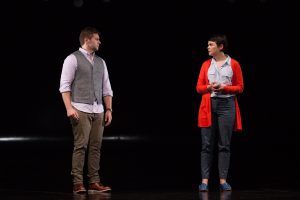
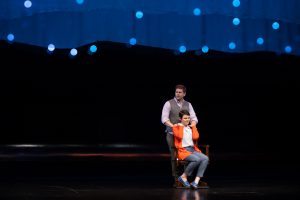
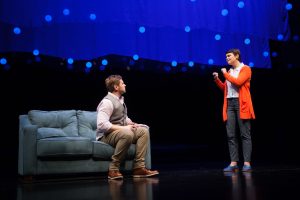
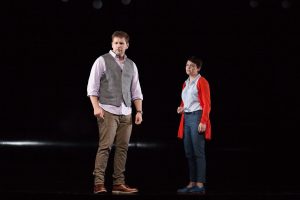
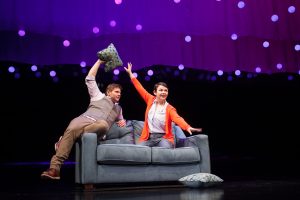
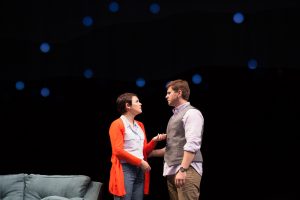

{ 1 comment… read it below or add one }
Thank you for your honest review. You’ve completely echoed my own sentiments! It was overkill, even with good acting. The stage was absolutely devoid of anything descriptive. The scant furniture moved around quite effectively, but it was, well, scant! I had no positive emotions, was waiting for something to happen, and was constantly disappointed. I’m a reviewer, thankful I wasn’t called upon to pen my opinion. You are brave!